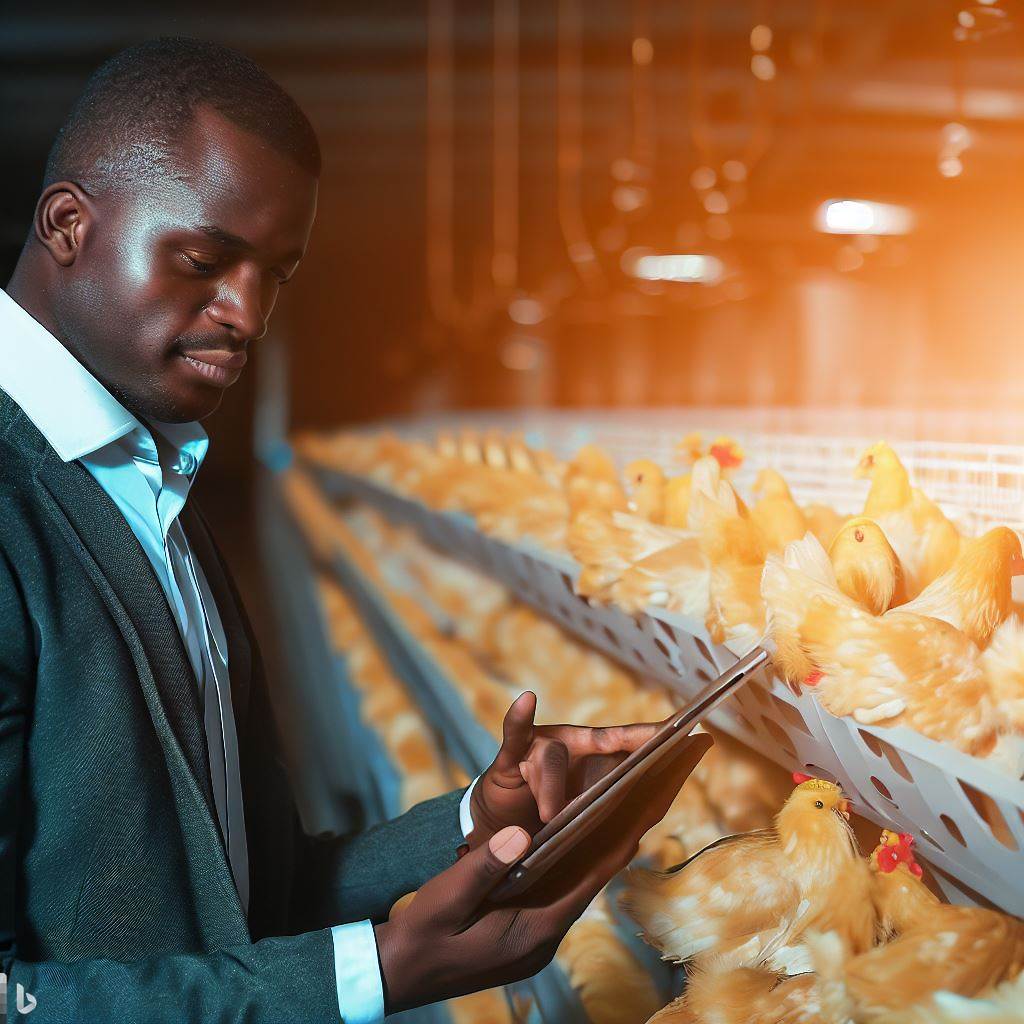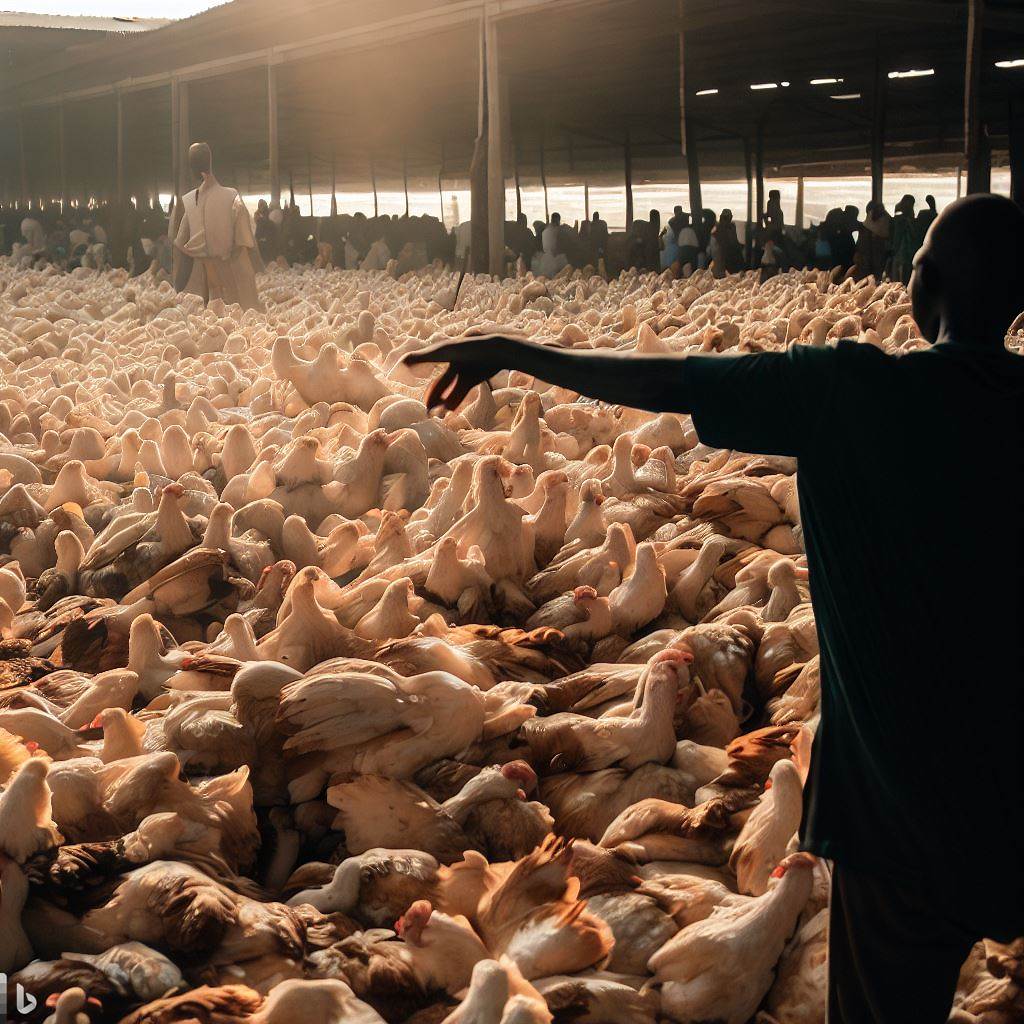Introduction
Nigeria’s poultry industry has been a significant contributor to the country’s economy.
With the constant growth and demand for poultry products, technology plays a vital role in the industry’s modernization.
This blog post explores the role of technology in Nigeria’s poultry industry and its impact on productivity and profitability.
Technological Advancements in Nigeria’s Poultry Industry
In recent years, the Nigerian poultry industry has witnessed significant technological advancements that have revolutionized the way poultry farming is conducted.
These advancements have not only improved efficiency but also increased productivity and profitability for poultry farmers.
Introduction of Automated Equipment in Poultry Farming
One of the most notable technological advancements in Nigeria’s poultry industry is the introduction of automated equipment.
These automated systems have replaced traditional manual labor, resulting in increased efficiency and reduced labor costs.
For example, automated egg collection systems have significantly simplified the process of collecting eggs from poultry houses.
These systems are equipped with sensors that detect and collect eggs at regular intervals, eliminating the need for manual egg collection.
Furthermore, the adoption of automated feeding systems has streamlined the feeding process.
These systems dispense the right amount of feed at predetermined intervals, ensuring that the birds receive adequate nutrition without wastage.
This has not only improved the overall health of the birds but has also resulted in cost savings for farmers.
Use of Temperature and Humidity Control Systems
Temperature and humidity control are crucial factors in poultry farming.
The introduction of advanced temperature and humidity control systems has enabled farmers to create optimal conditions for the birds, regardless of the external environment.
These systems use sensors and controls to monitor and adjust the temperature and humidity levels inside poultry houses.
They ensure that the birds are kept in a comfortable environment that promotes their growth and overall well-being.
Additionally, these control systems help prevent the occurrence of diseases that are often triggered by extreme temperature and humidity conditions.
By maintaining the right conditions, farmers can reduce the risk of disease outbreak and subsequently minimize losses.
Implementation of Smart Feeding Systems
Smart feeding systems have revolutionized the way poultry farmers manage the feeding process.
These systems use advanced technology to accurately monitor the feed consumption of individual birds in real-time.
Based on the data collected, the smart feeding systems automatically adjust the feed delivery to each bird, ensuring optimal feeding and minimizing wastage.
This level of precision has not only improved the birds’ health and performance but has also resulted in significant cost savings for farmers.
Adoption of Computerized Data Analysis and Management
The poultry industry in Nigeria has embraced computerized data analysis and management systems to enhance decision-making and streamline operations.
These systems collect and analyze data related to various aspects of poultry farming, such as production, sales, and health monitoring.
By harnessing the power of data, farmers can identify patterns, trends, and areas for improvement.
This enables them to make informed decisions that drive productivity and profitability.
Additionally, computerized data management systems facilitate efficient record-keeping, reducing paperwork and minimizing the chances of errors.
In fact, technological advancements have played a significant role in transforming Nigeria’s poultry industry.
Automated equipment, temperature and humidity control systems, smart feeding systems, and computerized data analysis have revolutionized the way poultry farming is carried out.
These advancements have improved efficiency, increased productivity, and ultimately contributed to the overall growth and development of the Nigerian poultry industry.
Improved Efficiency and Productivity
The Role of Technology in Nigeria’s poultry industry is paramount, significantly elevating operational efficiency.
Automated systems are integral, offering numerous advantages. These systems optimize environmental conditions, minimize manual labor, and boost productivity.
Crucially, temperature and humidity control systems enhance poultry growth and reduce mortality rates by maintaining ideal conditions.
Remote monitoring and adjustment of these systems through technology are feasible.
Smart feeding systems are transformative, enhancing feed conversion rates by precisely distributing appropriate amounts, minimizing waste, and improving monitoring.
Technological integration enables data collection and analysis, yielding insights for pattern identification, production optimization, and informed decision-making.
This tech-driven approach curbs labor costs, heightens profitability, and streamlines operations.
Embracing technology elevates Nigeria’s poultry industry, fulfilling rising demands while sustaining economic viability.
Every technological advancement, from temperature control to automated feeding, augments efficiency.
As technology progresses, adopting innovative solutions becomes imperative to remain competitive.
This integration will continue shaping and metamorphosing Nigeria’s poultry sector, necessitating investment for enduring growth.
All in all, technology revolutionizes the industry, fortifying efficiency, productivity, and sustainability.
Read: Promoting Gender Equality in Nigeria’s Livestock Sector

Disease Prevention and Health Management
- Technology plays a significant role in disease detection and prevention in Nigeria’s poultry industry.
- Sensors and monitoring systems are widely used in implementing effective biosecurity measures.
- Automated vaccination and medication procedures provide numerous benefits to poultry farmers.
- Technology aids in early disease diagnosis and treatment, improving overall poultry health.
The Nigerian poultry industry has undergone a remarkable tech-driven transformation, particularly in disease prevention and health management.
Modern technology has revolutionized disease detection, prevention, and treatment in poultry.
Technology’s primary role lies in disease detection and prevention. Advanced tools swiftly identify diseases, enabling rapid containment.
This curbs outbreaks, minimizing economic losses for farmers. Sensors monitor air quality, temperature, and humidity, maintaining ideal conditions.
Real-time data aids in swiftly identifying risks and taking preventive measures.
Automated vaccination and medication have greatly benefited poultry farming. Precision dosing reduces stress on birds and saves time.
Tech-enabled early disease diagnosis aids intervention, reducing disease spread and enhancing recovery. Targeted treatments improve disease management.
In essence, technology reshapes disease prevention and health management in Nigeria’s poultry sector.
Its pivotal role in early disease identification, precise dosing, and effective treatment enhances bird health.
As technology advances, the poultry industry’s disease prevention and management stand to gain even more.
Read: The Journey to Becoming a Poultry Producer in Nigeria
Find Out More: The Impact of Farming on Nigeria’s Food Security
Data Analysis and Decision-making
In the poultry sector, data analysis significantly guides strategic choices.
Computerized systems streamline accurate data collection and interpretation, bolstering industry success.
Crucially, data analysis uncovers insights, enabling farmers to grasp market dynamics.
Automated tools and software streamline data collection, reducing errors.
They manage vast data sets, simplifying analysis for actionable insights. Decisions, like refining feed costs and production rates based on data, optimize operations.
For instance, identifying favorable feed formulas elevates profitability.
Moreover, data analysis anticipates market trends. Historical sales and market indicators predict consumer preferences and pricing shifts.
Farmers adjust production or diversify offerings proactively. Technology enhances this process, enabling efficient complex analyses, supported by visuals like charts and graphs.
Common techniques include descriptive analysis summarizing data, diagnostic analysis discerning production influences, and predictive analysis forecasting future outcomes from historical data.
Most importantly data analysis’s importance in poultry thrives through computerized systems and technology. This practice illuminates informed decisions, market foresight, and sustained industry relevance.
Read: Top Challenges Faced by Nigerian Poultry Producers
Challenges and Future Trends
The role of technology in Nigeria’s poultry industry is pivotal, although it encounters obstacles.
Reliable electricity and internet access are crucial for harnessing technology’s benefits, yet they remain scarce, limiting farmers’ access to critical market information and training.
Financial burdens pose another hurdle; adopting technology requires substantial initial investments, straining small-scale farmers.
Equipment costs, upkeep, and training expenses inhibit seamless technology integration into their operations.
The rapid pace of technological evolution also challenges poultry farmers, who must continually upgrade their skills.
This ongoing learning process compounds existing business demands, placing stress on farmers.
Nonetheless, Nigeria’s poultry sector exhibits substantial growth potential. Artificial intelligence (AI) offers promise by automating tasks like health monitoring and disease prediction.
Drones, too, are gaining traction, providing real-time surveillance and data collection. Blockchain’s integration can revolutionize supply chain transparency, enhancing food safety.
In a nutshell, technology’s role in Nigerian poultry is hindered by power and connectivity limitations and high implementation costs.
Yet, embracing emerging trends like AI, drones, and blockchain can bolster efficiency and productivity, paving the path for a sustainable and profitable future.
Read: Effective Strategies for Poultry Production in Nigeria
Conclusion
The role of technology in Nigeria’s poultry industry cannot be overstated.
The main points discussed in this blog post include the use of technology for improved production, disease prevention, and efficient management.
Technology has significantly contributed to the growth and development of the poultry industry in Nigeria.
The significance of technology in Nigeria’s poultry industry cannot be ignored.
It has revolutionized the way poultry farming is done, resulting in increased productivity, reduced losses, and improved profitability.
Technology has also helped in addressing challenges such as diseases, feed management, and waste disposal.
To further enhance the poultry industry in Nigeria, it is crucial to encourage research and the adoption of advanced technologies.
Continued innovation and implementation of technology will lead to increased yields, improved animal welfare, and greater profitability for poultry farmers.
It is also important to invest in training and education to ensure that farmers have the necessary skills to effectively use these technologies.
In summary, technology has transformed Nigeria’s poultry industry and continues to play a vital role in its growth and development.
Embracing advanced technologies is key to overcoming challenges and maximizing the potential of the industry.
Further research and investment in technology will ensure a sustainable and profitable future for Nigeria’s poultry industry.




